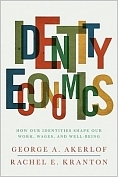| |||||
• polskie
• Zamów informacje o nowościach z wybranego tematu • kontakt |
IDENTITY ECONOMICS: HOW OUR IDENTITIES SHAPE OUR WORK WAGESAKERLOF G.A. / AND WELL-BEINGwydawnictwo: PRINCETON UP, 2011, wydanie Icena netto: Identity Economics provides an important and compelling new way to understand human behavior, revealing how our identities--and not just economic incentives--influence our decisions. In 1995, economist Rachel Kranton wrote future Nobel Prize-winner George Akerlof a letter insisting that his most recent paper was wrong. Identity, she argued, was the missing element that would help to explain why people--facing the same economic circumstances--would make different choices. This was the beginning of a fourteen-year collaboration--and of Identity Economics. The authors explain how our conception of who we are and who we want to be may shape our economic lives more than any other factor, affecting how hard we work, and how we learn, spend, and save. Identity economics is a new way to understand people's decisions--at work, at school, and at home. With it, we can better appreciate why incentives like stock options work or don't; why some schools succeed and others don't; why some cities and towns don't invest in their futures--and much, much more. Identity Economics bridges a critical gap in the social sciences. It brings identity and norms to economics. People's notions of what is proper, and what is forbidden, and for whom, are fundamental to how hard they work, and how they learn, spend, and save. Thus people's identity--their conception of who they are, and of who they choose to be--may be the most important factor affecting their economic lives. And the limits placed by society on people's identity can also be crucial determinants of their economic well-being. George A. Akerlof, winner of the 2001 Nobel Prize in Economics, is the Koshland Professor of Economics at the University of California, Berkeley. He is the coauthor, with Robert Shiller, of "Animal Spirits: How Human Psychology Drives the Economy", and "Why It Matters for Global Capitalism" (Princeton). Rachel E. Kranton is professor of economics at Duke University. Table of Contents
PART ONE: Economics and Identity CHAPTER ONE: Introduction 3 PART TWO: Work and School CHAPTER FIVE: Identity and the Economics of
Organizations 39 PART THREE: Gender and Race CHAPTER SEVEN: Gender and Work 83 PART FOUR: Looking Ahead CHAPTER NINE: Identity Economics and
Economic Methodology 113 Acknowledgments 131 192 pages, Paperback Księgarnia nie działa. Nie odpowiadamy na pytania i nie realizujemy zamówien. Do odwolania !. |


